1914 - 1929
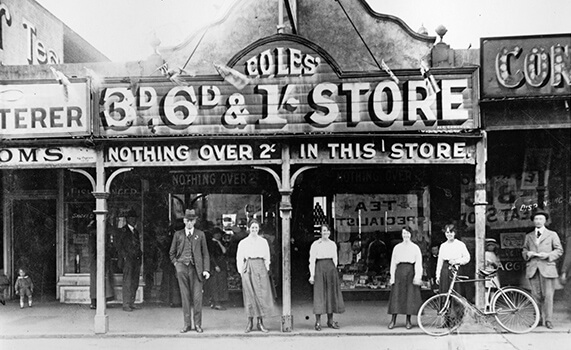
On 9 April 1914, G.J. Coles opened the first Coles store in Smith Street, Collingwood, Victoria.
On the day of opening, the window displays promised: 'Nothing over 1/-.'
The first day's sales were a good indication of things to come and after ten days of trading takings stood at 935 pounds, 4 shillings and 1 penny.
1930 - 1939
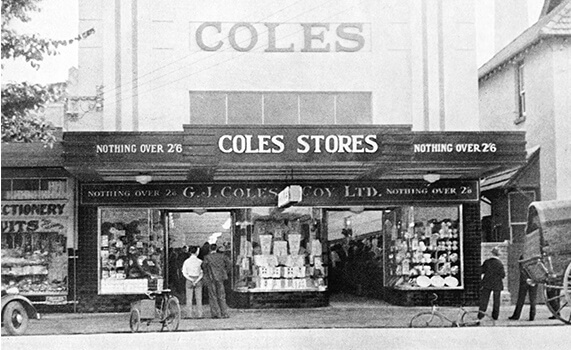
Despite tough economic times during the Great Depression, Coles continued to donate a large share of profits to charities including hospitals, nursing homes and relief funds for the unemployed.
1940 - 1949
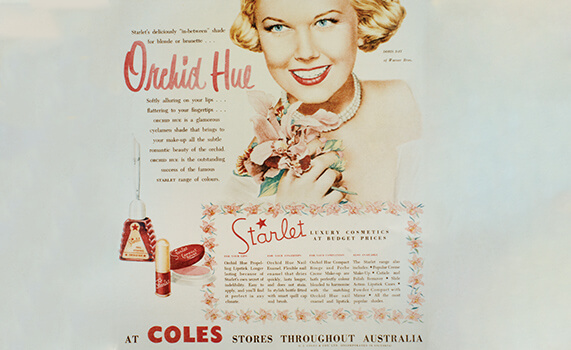
The impacts of World War II changed Coles and our customers. Many married women had become part of the workforce, which meant they had less time at home to prepare food for the family. As a result, they began buying more ready-made foodstuffs and delicatessen items, leading to an increase in these lines in Coles stores.
In 1946, confidence boomed in post-war Australia and Coles began selling electrical appliances such as toasters and irons.
In 1948, Coles launched its first cosmetics range and engaged starlets Doris Day, Arlene Dahl and Eleanor Parker as the faces of the campaign.
1950 - 1959
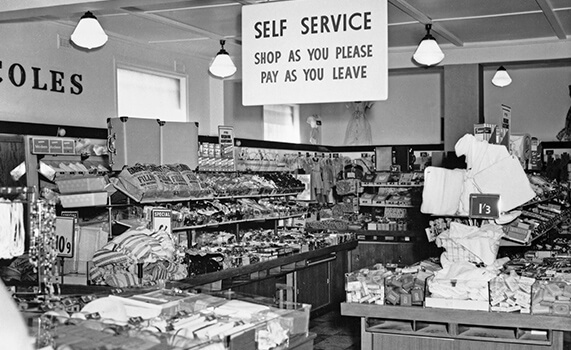
By the mid-50s, Coles stores were converting into self-service stores which would set the standard for supermarkets into the 21st century. By the end of the decade, Coles had shifted course from our origins as a variety store and set our sights on becoming Australia's most significant food retailer, with new logistics, warehousing and distribution systems required for such a challenge.
1960 - 1969
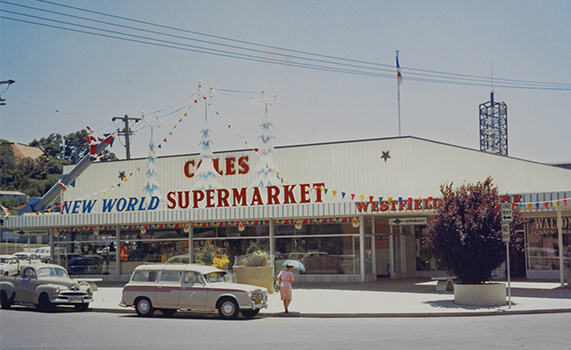
The 60s were a time of change in Australia. Though he had been Managing Director of Coles since before the end of WWII, Edgar Barton Coles was inspired by the sense of progress and embarked on a program of delivering "tomorrow's shops, today" to an increasingly affluent Australia.
In 1960, Coles opened the nation's first freestanding supermarket in Balwyn, Victoria. Edgar's plan was to develop a chain of supermarkets that would stock everything a family might have on their weekly household shopping list, from light bulbs to lemons, making it possible to get it all in a single trip.
1970 - 1979
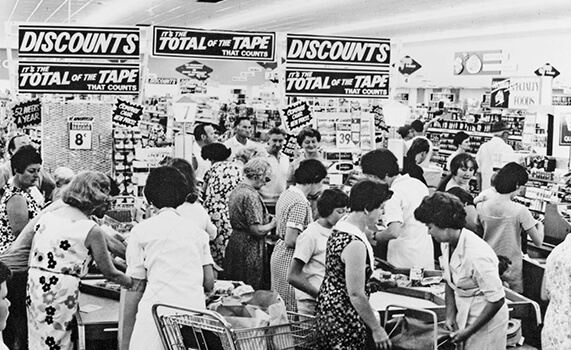
Coles entered the 70s with a network of retail outlets stretching across the country and a fresh focus on value, convenience and innovation for the benefit of Australian shoppers.
Coles showed our innovative streak in the development of the Farmland range of home brand food products, helping to reduce the cost of groceries. Coles also launched a discounting program in 1971, permanently reducing prices on 7000 items.
1980 - 1989
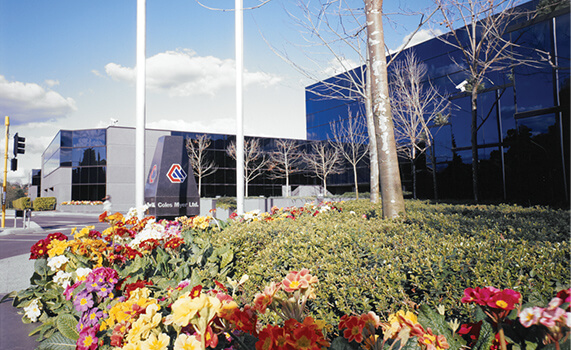
The 80s was a decade of economic confidence in Australia with the floating of the Australian dollar heralding unprecedented business expansion and prompting Coles to look for new opportunities. Coles introduced the first electronic scanners into stores in 1982, giving customers a printed receipt which itemised all their purchases for the first time.
By the mid-80s, Coles established liquor interests under Liquorland and Vintage Cellars. The expansion continued with the acquisition of Bi-Lo, specialty fashion chains and the department store chain, Myer Emporium Ltd Group. On 25 July 1985, Coles Myer Ltd was born.
In 1987, the Coles Myer corporate headquarters was opened in Tooronga, Victoria, by Prime Minister Bob Hawke.
1990 - 1999
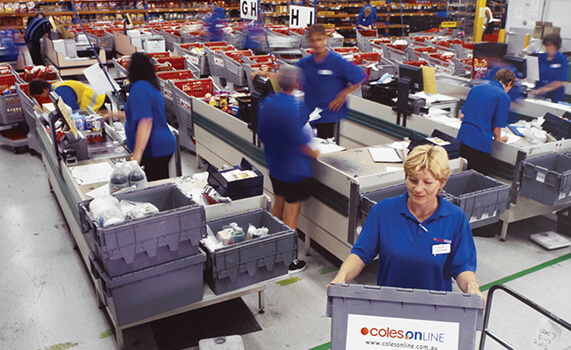
The 90s was the decade of the dot-com boom, borne from the rapid increases in technology and the advent of the World Wide Web. For Coles, the 90s meant adopting new technology to modernise inventory tracking. The cost saved by this technology was reinvested into reducing the price of a further 6,000 product lines.
Coles launched the flybuys program in 1993, enabling customers of Shell, National Australia Bank and Coles Myer to earn points towards free air travel simply by shopping. Within a year of the launch, 3.5 million Australians were flybuys members.
Coles continued to embrace the evolution of technology and trialled online shopping within 23 Melbourne postcodes in June 1999.
2000 - 2009
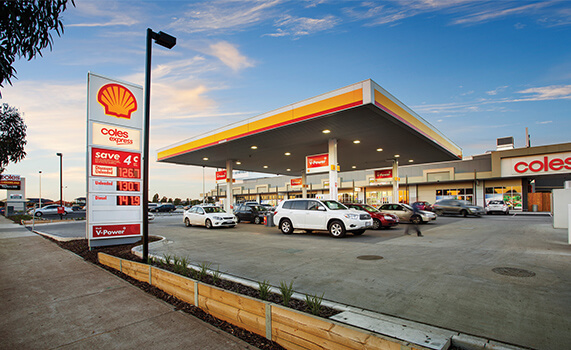
The 2000s came with an influx of economic uncertainty as interest rates continued to rise while the Australian Dollar declined. In that time, our online channels grew and by 2003 Coles became one of the largest online food retailers in the country.
In mid-2004, Coles established a nationwide network of Coles Express service stations, providing customers with greater access to food through new petrol and convenience stores.
Coles sold Myer in 2006 and returned to our heritage as primarily a food retailer. In 2007, Coles was acquired by another iconic Australian company, Wesfarmers.
2010 - 2018
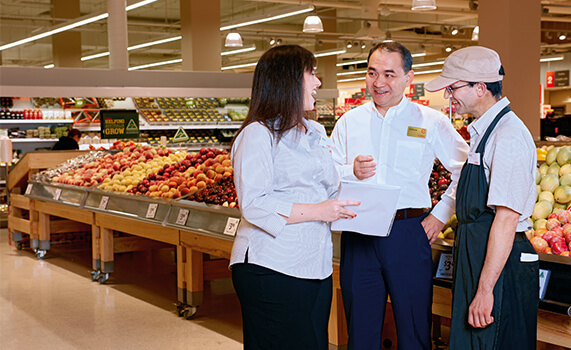
Under Wesfarmers’ ownership, Coles commenced a turnaround focussed on restoring pride in the Coles brand and developed a strategy based on giving Australians a shop they could trust, delivering innovation, quality, service and value.
Coles invested in significant changes to improve the customer experience, including the roll-out of new-format stores, lowering prices as part of our ‘Down Down’ campaign and investing in team members to create a culture of selling and serving with personality.
From 2010, Coles launched a series of animal welfare and responsible sourcing initiatives, including phasing out sow-stalls for pig farming, providing hormone free beef and committing to cage-free Coles Brand eggs. In 2012, Coles launched the Australia First Sourcing Policy. Today, 96% of fresh produce and 100% of lamb, pork, chicken, beef, milk and eggs are Australian sourced.
Over this time, Coles also expanded our community engagement, including through national partnerships with SecondBite, Redkite, Little Athletics and Athletics Australia. In 2015, Coles launched the $50 million Coles Nurture Fund to support Australian small businesses grow and innovate.
In 2018, Coles launched the ‘Good Things are Happening at Coles’ campaign, reflecting Coles’ broader proposition to our customers, suppliers and the communities in which we operate.
In March 2018, Wesfarmers announced its proposal to demerge Coles, presenting an exciting opportunity for Coles to become a standalone publicly listed company on the Australian Securities Exchange. The demerger was agreed to by Wesfarmers shareholders in November 2018 and Coles Group listed on the Australian Securities Exchange on 21 November 2018.
Into the future, Coles remains committed to delivering consistently high quality fresh food, product innovation, successful long-term partnerships with suppliers, great value for our customers and returns for our shareholders.
